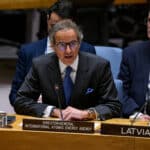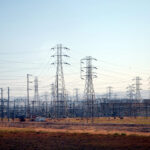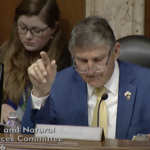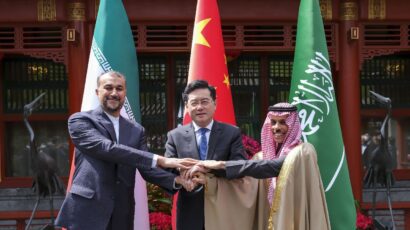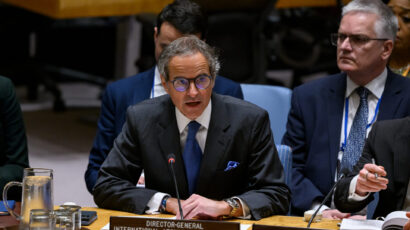The future of GNEP: The international partners
By Leonor Tomero | July 31, 2008
The objective of the Global Nuclear Energy Partnership (GNEP), which President George W. Bush unveiled in 2006, is to enable the global expansion of nuclear energy while limiting the spread of uranium enrichment and reprocessing technologies. It would establish a group of nuclear supplier states and allow them to provide nuclear fuel at reasonable cost to recipient states, take back spent fuel for reprocessing (separating plutonium from nuclear waste), and reuse the recovered plutonium in new fuel for nuclear reactors.
GNEP also envisions a resumption of commercial reprocessing in the United States and eventual reuse of the separated plutonium in future fast neutron reactors, which can either make or "breed" more plutonium than they use or burn excess plutonium depending on the configuration of the reactor. In addition, the GNEP plan includes using reprocessed plutonium in existing light water reactors until fast neutron reactors are developed and available commercially.
Although a skeptical Congress has cut GNEP funding in 2007 and 2008, the Energy Department has forged ahead. GNEP now has 21 partners and 37 observer states. They include countries with a range of interests–from being supplier states (i.e., Canada, Australia, and Jordan) to pursuing research and development of sensitive fuel-cycle technologies (i.e., South Korea). Other nations such as Ghana simply want to develop nuclear energy.
GNEP partners plan to invite an additional 25 countries, including several from the Persian Gulf, to join the partnership this fall. While the Energy Department has touted the growth of GNEP membership, member countries aren't asked to make legally binding commitments or commit any funding. Partners merely agree to support the expansion of nuclear energy and the closure of the fuel cycle by signing the GNEP Statement of Principles.
The weaknesses of the program weren't lost on Congress, with the House Energy and Water Appropriations Committee noting that it zeroed GNEP funding because of the program's proliferation risks.
With regard to GNEP's international aspects, the 2009 House Committee report specified, "No funds are provided for any continued work on GNEP, including the department's efforts to solicit developing partner countries in the GNEP program." It instructed Energy to continue to coordinate GNEP's research and development arm with countries that already have advanced fuel-cycle capabilities (Britain, France, and Japan), but not to work with countries aspiring to have nuclear capabilities. No similar provisions were contained in the Senate bill, and it's unclear whether this language will be retained in the event of a continuing resolution, a requirement if, as appears likely, Congress doesn't finalize the 2009 Energy and Water Appropriations bill.
Thus, GNEP is in limbo even as Energy attempts to create a broad international coalition to support the partnership before the Bush administration leaves office.
GNEP and nuclear proliferation
With the prospect that GNEP would define for the foreseeable future which states are considered nuclear suppliers and allowed to develop domestic enrichment and reprocessing facilities, there's been a scramble among nations to slip in before the door closes. Countries that don't currently enrich uranium or reprocess such as South Africa, Argentina, Canada, and South Korea have all declared their interest in acquiring sensitive nuclear technologies since GNEP was announced.
GNEP has also encouraged research and development into reprocessing. As part of the partnership, the United States is actively cooperating with South Korea on reprocessing and fast neutron reactors–after decades spent dissuading Seoul from developing either. Now, South Korea advertises its plan for building reprocessing and fast reactor facilities. Unless restrictive language suggested by the House Energy and Water Development Subcommittee is adopted, this type of cooperation could continue.
Similarly, at the 2007 May and September GNEP ministerials, the United States backpedalled on its initial promise that GNEP wouldn't promote the separation of pure plutonium from spent nuclear fuel. Only 18 months earlier, Energy had argued for new "proliferation-resistant technologies" to recycle spent nuclear fuel. Yet, the GNEP Statement of Principles accepted and signed at the September ministerial in Vienna qualified the encouragement of "proliferation-resistant" technologies by including mention of the "long-term goal of ceasing separation of plutonium" [emphasis added], leaving the door wide open for further increases in weapons-usable plutonium stocks.
Therefore, GNEP will significantly increase the worldwide reprocessing of spent fuel and legitimize the separation of tons of weapons-usable plutonium in the future, contrary to its stated nonproliferation goals. According to the 2007 International Panel on Fissile Materials report, the civilian stocks of separated plutonium already total 250 metric tons, enough for more than 30,000 nuclear weapons.
Forty or more countries–including Egypt, Libya, Algeria, Morocco, Jordan, Turkey, Saudi Arabia, the United Arab Emirates, and Yemen–have indicated an interest in starting nuclear energy programs since 2004, and several plan to sign nuclear cooperation agreements, with countries including the United States, despite not have adopted the International Atomic Energy Agency (IAEA) Additional Protocol. In addition, this new momentum and interest may lead these countries to seek sensitive fuel-cycle technology later as well.
Admittedly, GNEP isn't the only factor that has contributed to the renewed interest in enrichment and reprocessing technologies–Iran's efforts to develop the capability to enrich uranium has undeniably contributed to the nuclear calculations of countries in the Middle East. Nevertheless, GNEP has had an impact in increasing the perceived prestige of acquiring such capabilities.
GNEP isn't the only international proposal
Regardless of GNEP's fate, preventing the future spread of sensitive nuclear technologies will remain a complex task. Alternate schemes have been proposed. Most provide fuel-supply assurances to recipient countries, but don't address the fuel-cycle's back-end (the disposal or reprocessing of spent nuclear fuel) and still leave many questions unanswered.
IAEA Director General Mohamed ElBaradei has proposed placing all enrichment and reprocessing facilities under multinational control and for suppliers to ensure a steady supply of nuclear fuel for potential buyers.
The Nuclear Threat Initiative pledged $50 million as start-up money for the establishment of an international fuel reserve. The IAEA would control the reserve, which would only be used as a last resort in the event of international nuclear fuel market disruptions. The fuel would be intended for countries that don't have indigenous uranium enrichment facilities. Congress provided $50 million of the $100 million required matching funds for the project. A promising start, this proposal would likely require additional funds to provide an adequate fuel supply and storage location. Criteria for access to the fuel would also have to be agreed upon.
The "Six-Country Concept" for reliable access to nuclear fuel, proposed by the United States, France, Germany, the Netherlands, Russia, and Britain–all nations with enrichment facilities, would require recipient states to forego sensitive indigenous nuclear facilities. In the event of a supply disruption, the recipient country could approach the IAEA to facilitate new arrangements with other suppliers if nonproliferation conditions such as Additional Protocol and safety and protection standards were satisfied.
Other international schemes include:
- A new IAEA-controlled enrichment facility, run on a commercial basis and located in an extraterritorial/neutral location–proposed by Germany.
- A uranium and enriched-uranium suppliers registry maintained by the IAEA–proposed by Japan.
- International, commercially operated uranium enrichment centers, based on Russia's new enrichment center with Kazakhstan and Armenia located in Angarsk, Siberia–proposed by Moscow.
- International reprocessing and storage facilities, with fuel supplied through commercial contracts and guaranteed by the IAEA and with stocks of fuel under IAEA authority–also proposed by Russia.
- A strategic reserve of 17.5 tons of highly enriched uranium that would be downblended and used in cases of disruption of fuel supply–proposed by the United States.
- Enrichment bonds which would guarantee uranium enrichment services (subject to nonproliferation conditions) between the supplier state, recipient state, and IAEA–proposed by Britain.
These proposals cannot eliminate all proliferation risks. The plans involving multinational facilities would reduce the risk that spent fuel might be reprocessed to make nuclear weapons and increase the likelihood that a diversion would be detected. But any spread of these technologies–even under multinational control or with "black-box" technology–presents some proliferation risk. Additionally, many of these proposals rely on convincing recipient countries to forego sensitive nuclear technologies based on their high cost and the establishment of an assured fuel supply. While the implementation of these proposals would make continued interest in developing such "dual-use" technologies suspect, the perceived prestige of acquiring nuclear know-how and the perceived advantage of appearing nuclear weapons-capable may outweigh economic considerations.
Also, these proposals would result in increased nuclear fuel production and exports, and the projected financial benefits of selling enriched uranium is a main reason why South Africa and Canada have expressed interest in developing domestic enrichment.
The issue of spent fuel disposal is another aspect about which the international community hasn't made any concerted decisions. Options include returning fuel to the country of origin for reprocessing, shipping it to an international reprocessing center, waiting for the potential development of "proliferation-resistant" reprocessing and fast reactor technologies, or placing the spent fuel in permanent domestic or foreign geological storage. ElBaradei endorses developing proliferation-resistant technologies, but since the available technologies can be tweaked relatively easily to yield pure plutonium, they, too, present significant proliferation risks.
Weakening the rules
As interest in acquiring sensitive fuel-cycle technologies increases, the rules that govern such transfers are being weakened. Notably, this year, the Group of Eight didn't renew its ban on the export of sensitive nuclear technology. At their July meeting in Hokkaido, Japan, they announced their support for weaker Nuclear Supplier Group (NSG) rules and even envisioned the first exports of enrichment and reprocessing technologies occurring in the next year.
Allowing transfers to countries that don't already have operating facilities would be a drastic change in international nonproliferation norms. Such a policy shift suggests that a country such as Japan, the only non-nuclear weapon state to reprocess, may now serve as the model for other non-nuclear weapon states that want to get into the plutonium production business. If dozens of such countries opted to engage in reprocessing, preventing proliferation would become much more difficult.
The United States–and depending on upcoming developments, perhaps the NSG–offered India, which has neither signed the Nuclear Non-Proliferation Treaty (NPT) nor made any meaningful nonproliferation commitments, the option to import sensitive nuclear technology as long as it was a member of GNEP or an international fuel bank. Washington made this change possible when Congress passed the Henry Hyde Act in 2006 to legalize exports of nuclear fuel, material, and technology even though India didn't have the international safeguards required by the NPT.
The U.S.-India agreement for nuclear cooperation, technically a "123 agreement" after a specific provision of the 1954 Atomic Energy Act that codifies the terms and conditions of cooperation, was negotiated last year and still requires congressional approval. The deal would allow India to reprocess U.S.-origin fuel and will lead to India producing stocks of weapons-usable material. Thirty-four years ago, India used U.S. and Canadian heavy water reactors to produce the plutonium for its 1974 nuclear test. The dual-use risks of peaceful reprocessing haven't receded since then.
At the moment, the deal is being debated by the IAEA and NSG; ultimately, Congress will have to approve it. The United States and India are currently pressing the NSG to make changes to international rules that would allow the reprocessing provisions without any preconditions.
The administration has also submitted to Congress a controversial U.S.-Russian 123 agreement, which, if approved, could facilitate a subsequent agreement to allow reprocessing of U.S.-origin spent fuel in Russia. (The outcome of this agreement is also uncertain.)
In addition to the spread of sensitive fuel-cycle technology, a global boom in nuclear power will also lead to an increase in less proliferation-resistant reactors. For example, in June, Canada signed a memorandum of understanding with Jordan, enabling Amman to import Canada Deuterium Uranium (CANDU) reactor technology. CANDU reactors use natural uranium fuel (foregoing the need for enrichment) and don't need to be shut down while spent fuel is removed, making it easier to secretly separate weapon-grade material.
The rush to expand nuclear energy has resulted in many ad hoc developments, an increased interest in sensitive nuclear technologies, and a weakening of rules governing nuclear trade. GNEP has exacerbated the risk of nuclear proliferation while many other proposals do not offer a foolproof solution. Clear rules and a careful, concerted international approach to limit proliferation are needed. Although Congress has slowed GNEP's implementation, it may already be too late (or at least too difficult) to convince non-nuclear weapon countries to give up their nuclear ambitions. Yet, halting the spread of sensitive nuclear technologies and establishing a fair international system–rather than encouraging a system of haves and have-nots–will be crucial to ensuring that the risks associated with an expansion of nuclear power remain manageable.
Together, we make the world safer.
The Bulletin elevates expert voices above the noise. But as an independent nonprofit organization, our operations depend on the support of readers like you. Help us continue to deliver quality journalism that holds leaders accountable. Your support of our work at any level is important. In return, we promise our coverage will be understandable, influential, vigilant, solution-oriented, and fair-minded. Together we can make a difference.
Topics: Nuclear Energy


